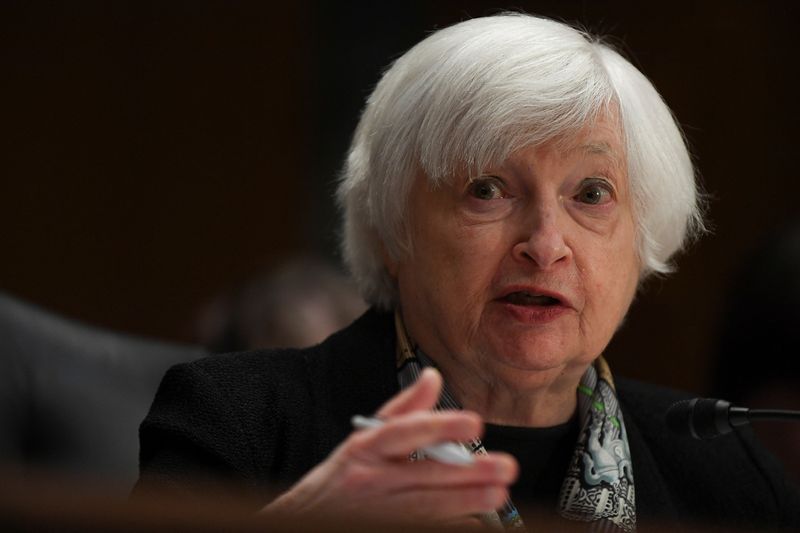By David Lawder
CHICAGO (Reuters) - U.S. President Joe Biden's second-term economic agenda will focus heavily on "tax fairness" that makes wealthy people and corporations pay more, and will likely revisit unrealized funding for child care and other workforce expansion programs, Treasury Secretary Janet Yellen said on Thursday.
Yellen, who is in Chicago to tout Biden's economic strategy, told reporters the Democratic president intends to keep tax cuts introduced by former President Donald Trump in place for those earning under $400,000 after 2025, when they are due expire.
Most business tax cuts passed by Republicans in 2017 were made permanent, but some provisions, such as a 20% deduction of qualified business income for "pass-through" business owners, and an employer credit for paid family and medical leave, will expire.
"He's going to be focused on making sure that tax cuts that disappear for those corporations in these expiring provisions are not extended," Yellen said. "And that we're not negotiating new tax breaks for wealthy individuals."
The top individual tax rate of 37%, on income in 2023 above $578,125, or $693,750 for couples, is set to snap back to 39.6% after 2025 when the individual tax provisions of the 2017 Tax Cuts and Jobs Act expire.
Yellen also said Biden would seek to protect the funding for the Internal Revenue Service, which was reduced to about $60 billion over 10 years from $80 billion by a bipartisan top-line spending deal on government agencies for the 2024 fiscal year.
CHILD CARE REVISITED
Yellen said she did not have detailed information on Biden's social and education agenda that was largely unrealized in the first term. But Biden was likely to revisit policies such as early childhood education, childcare programs to help women participate in the labor force and paid family leave.
"I think they - in my mind - fit in with a modern supply-side agenda because it's about productivity, but also participation in the labor force and training," she said.
Modern supply-side economics is Yellen's term for Biden's strategic spending and investment aimed at increasing the productive capacity of the economy, including infrastructure, clean energy and workforce training and expansion programs.
Yellen said a separate, $78 billion deal to temporarily expand the Child Tax Credit and extend certain business investment deductions through 2025 is "certainly a package that's worth considering"
She said she was happy to see the package paid for by closing Employee Retention Tax Credit claims early, adding that the pandemic-era program approved in 2020 under the Trump administration has been subject "to an enormous amount of fraud."
OUTLOOK RISKS
Regarding risks to the U.S. economic outlook, Yellen said there have not been "meaningful" spillovers to the U.S. economy from conflict in the Middle East.

"Shipping costs have moved up, but we're not seeing any significant effect. We're monitoring closely."
Overall, the U.S. economy is on a "very desirable path" despite such risks, she said. Yellen added that her "guess" was that the Federal Reserve is "delighted with what they're seeing, having inflation very close back to their (2%) target and a strong labor market. And they will want to see that continue."